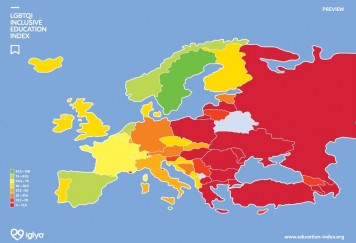On January 23, Members of the European Parliament, representatives from European Institutions, Member State governments, and civil society organisations met at the European Parliament for the launch of the first LGBTQI Inclusive Education Index and Report, created by IGLYO – The International Lesbian, Gay, Bisexual, Transgender, Queer & Intersex (LGBTQI) Youth and Student Organisation. The event, hosted by the Intergroup on Children’s Rights and the Intergroup on LGBTI Rights, was an important opportunity for Member States to review their responses to homophobic, biphobic, transphobic and interphobic violence in schools, and to discuss concrete measures to be taken.
Over the course of 2016, IGLYO asked LGBTQI young people from across Europe to share their experiences of school, captured in the film No More Hiding. Regardless of the country in which they lived, many of their stories were frighteningly similar. UNESCO’s international report, Out in the Open, also shows that the prevalence of violence in schools is between three and five times higher towards LGBTQI young people. The Council of Europe Member States, however, have made specific commitments to warrant the right to education for all students.
IGLYO’s LGBTQI Inclusive Education Index and Report provide much needed qualitative data on areas such as laws, policies, teacher training, inclusive curricula to highlight both good practices and areas for development in each country and ensure that LGBTQI learners feel safe, supported and included within state educational institutions. One of the important elements of the project is that the information is segregated between sexual orientation, gender identity and expression, and variations in sex characteristics, to ensure all learners within the LGBTQI spectrum are included.
The LGBTQI Inclusive Education Index ranks all 47 Council of Europe Member States. The top 5 countries with the highest Index include Malta, Sweden, Norway, Netherlands and Spain. The lowest rating countries include Armenia, Azerbaijan, Latvia, FYR Macedonia, Monaco, Poland, Russian, San Marin and Turkey. Lithuania ranks 30th out of 47 Council of Europe Member States.
The initial results reveal that 31 Council of Europe Member States already have anti-discrimination laws applicable to education with express mention of sexual orientation, gender identity and expression or variations in sex characteristics as protected grounds.
The Report notes that the Law on Equal Treatment and the Education Law establishes the obligation to ensure equal conditions for persons regardless of their sexual orientation. Discrimination on grounds of sexual orientation is also prohibited in the Health and sexuality and family life education programme. However, neither the law nor the programme mentions discrimination on grounds of gender expression and identity, or variations in sex characteristics. Situation is complicated further by the Law on the Protection of Minors, which prohibits dissemination of information having a detrimental effect on minors, including the promotion of “homosexual, bisexual or polygamous relations”.
The Report also highlights that one of the most pressing, yet unrecognised issues in Lithuanian schools is bullying. According to the LGL’s survey, 4 out of 5 LGBTQI students experience bullying due to their sexual orientation and/or gender identity. A lack of LGBTQI content in the national curriculum and non-existent teacher training on LGBTQI awareness create additional challenges in the fight against homophobic bullying.
Following the launch of the preliminary data, IGLYO aims to work closely with governments, actively encouraging them to review the data presented and respond before the Report and Index are finalised for the International Day Against Homophobia and Transphobia (IDAHOT) on 17 May.




